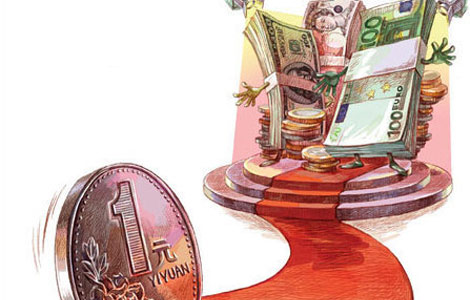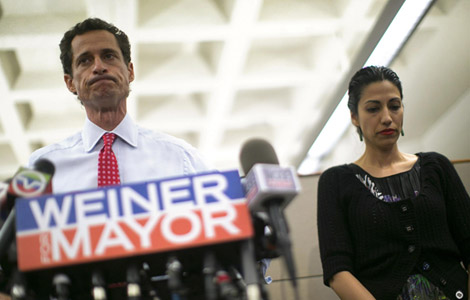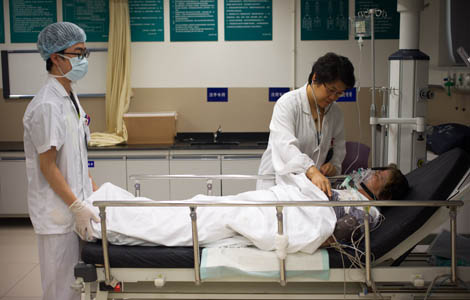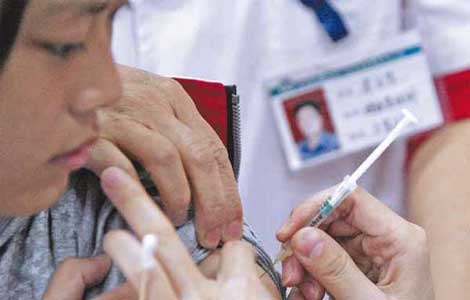Pharma corruption crackdown widens
Updated: 2013-07-24 10:54
By Zhang Yuwei in New York and Wang Zhenghua in Shanghai (China Daily)
|
|||||||||
A US citizen has been detained in Shanghai as probes spread in a corruption scandal in the pharmaceuticals industry sparked by British drug-maker GlaxoSmithKline, a US embassy official confirmed on Tuesday.
The US embassy in China hasn't identified the individual and whom the detainee is associated with.
"We are aware that a US citizen has been detained in Shanghai. We are in contact with the individual and are providing all appropriate consular assistance," Reuters quoted US embassy spokesman Nolan Barkhouse as saying.
The move is the latest in development in investigations surrounding the GSK case. The detainee is the first American and second foreign national to be held after a British risk consultant associated with GSK was taken into custody last week. Chinese authorities have detained four Chinese GSK executives on allegations that employees paid nearly $490 million (3 billion yuan) in bribes through travel agencies to hospital officials and doctors to boost sales.
Police visited the Shanghai office of another British drug-maker, AstraZeneca, and detained a sales employee of the company last Friday, as China intensified a crackdown on commercial corruption in the medical sector.
"What is different here is not so much the detention of a US citizen as the fact that the Chinese have been taking action against the individual Chinese nationals on the receiving or soliciting ends of the bribes," said Clif Burns, an attorney with Bryan Cave LLP.
"The US will be hard pressed to complain about the Chinese detention of a US citizen here because bribery of Chinese officials by US citizens also violates US law, and it appears that GlaxoSmithKline has more or less conceded that some of its executives may have engaged in corrupt activities in connection with the sales of the company's products to doctors and hospitals in China," said Burns.
Carl A Valenstein, a Washington-based partner with Bingham McCutchen LLP, said the recent developments in China show that the Chinese government is beginning to crack down on certain marketing activities as part of a broader anti-corruption campaign.
"Given cultural differences, this effort has met with challenges and there have been a number of US enforcement cases under the US Foreign Corrupt Practices Act in this area because most Chinese doctors are employed at government owned hospitals and are viewed by the US government as falling within the definition of 'foreign government officials' for purposes of the FCPA's anti-bribery provisions," said Valenstein.
Julian Chang, executive director of the Ash Center at Harvard Kennedy School, said "it's significant that the spotlight has now turned to the health care sector, which is one of the priority sectors for the new leadership, after having been on mining (Rio Tinto)."
A salesperson with Eli Lilly and Co said on Tuesday that there has been a lot of discussion among industry workers that it is a difficult time for foreign pharmaceutical companies and their staff, especially their sales force.
"It's hard to see for now how the country's sudden brake on commercial corruption in the medical sector will affect each individual's sales performance, but we feel very dismayed," said the source, who asked to remain anonymous.
"I don't understand why the foreign firms are singled out in the crackdown. We are definitely not the fundamental cause generating the disorder in the medical sector, or a main contributor in the strained relations between doctors and patients," he added.
The National Health and Family Planning Commission, on the other hand, pledged to deepen medical reforms. A mechanism will be set up to replace the current practice of hospitals relying mainly on revenue from medicine, and a blacklist system will be improved for individuals and companies involved in bribery, Li Bin, the commission's minister, said recently.
The world's No 2 economy is attracting foreign investors from a wide range of industries. Pharmaceutical sales in China reached $69 billion in 2012, according to the Economist Intelligence Unit which predicts the sales will double to $166 billion by 2017.
British GSK is one of 38 multinational drug companies operating in China. It invested some $3 billion in the Chinese market between 2006 and 2010, according to the R&D-based Pharmaceutical Association Committee under the China Association of Enterprises with Foreign Investment, a non-profit organization made up of 39 member companies with pharmaceutical R&D capability.
By 2016, China will overtake Japan to become the world's second-largest drug market behind the US, according to IMS Health which tracks pharmaceutical industry trends.
The ongoing investigation has been an alert for foreign firms who target the Chinese market, said Valenstein.
"The detention of personnel to respond to these allegations is a source of concern and could affect the willingness of non-Chinese companies to send their personnel into China," said Valenstein.
"Pharmaceutical and medical device companies and other companies doing business in China are watching these developments closely," he added.
yuweizhang@chinadailyusa.com
(China Daily USA 07/24/2013 page1)
Most Viewed
Editor's Picks

|

|

|

|

|

|
Today's Top News
Guangzhou to launch 72-hour visa-free stays
US diplomat says China ties a priority
Pharma corruption crackdown widens
NFL makes cyber play in China
US still top choice for students
Nation falling short on IT security
Weiner not dropping out of NYC mayoral race
Death toll from H1N1 in Argentina reaches 38
US Weekly

|

|















